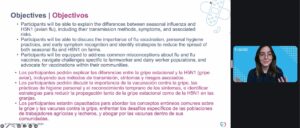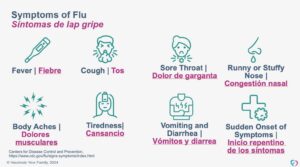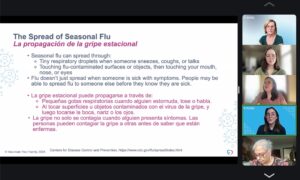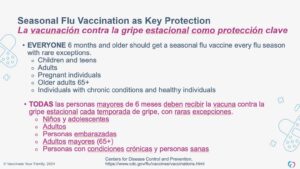VYF hosted flu training with the National Center for Farmworker Health
VYF’s Advocacy & Education Department partnered with the National Center for Farmworker Health to provide a training on seasonal and H5N1 avian flu.
To prepare outreach workers for the upcoming 2024-2025 flu season and the H5N1 bird flu outbreak, Vaccinate Your Family’s Advocacy & Education Department partnered with the National Center for Farmworker Health (NCFH) and provided a free, bilingual flu training. Presented by Serese Marotta, VYF’s Advocacy & Education Director, and Katrina Fernandez, Advocacy & Education Intern, the online webinar covered seasonal and avian flu information, vaccine advocacy and access, and protective, preventative strategies to help farmworkers navigate flu season.
Flu symptoms, transmission, and risks
The training included an overview of seasonal influenza, including flu symptoms, transmission, and risks. Commonly known as flu, influenza is a contagious respiratory illness caused by flu viruses that affects the nose, lungs, and throat. There are four types of influenza viruses – A, B, C, and D. Influenza A and B viruses cause seasonal flu, and influenza A can cause pandemics.
Flu can have various symptoms, such as:
- Fever
- Cough
- Sore throat
- Runny or stuffy nose
- Body aches
- Tiredness
- Vomiting and diarrhea
Flu symptoms can appear suddenly and quickly become serious, leading to complications like disability, hospitalization, and death. People can spread flu prior to developing symptoms, before they even know they are sick.
Flu transmission occurs through small respiratory droplets when someone sneezes, coughs, or talks, or by touching your mouth, nose, or eyes after handling contaminated objects. Everyone is at risk of contracting flu during flu season, particularly from October to May, and certain groups are more likely to develop serious complications, including young children, older adults (65+), pregnant individuals, and people with chronic conditions. Due to the ongoing outbreaks of H5N1 influenza in dairy cow herds and poultry flocks, farmworkers are vulnerable to both seasonal and H5N1 avian flu infections.
For more information on the 2024-2025 flu season, click here.

Avian/Bird Flu
The training also included a session on avian flu, also known as bird flu. Avian flu refers to influenza viruses that primarily infect birds but can occasionally infect humans, dairy farm animals, and other animals. Currently, the most notable circulating strain of avian flu is H5N1.
Current H5N1 Bird Flu Situation
H5N1 is a highly pathogenic avian influenza (HPAI) virus that mainly affects birds but can sometimes spread to wild animals, dairy farm animals, and humans through exposure to infected animals. This year, there have been multi-state outbreaks of H5N1 among dairy cows, poultry flocks, and recently, a pig.
Following the first reported case of HPAI A(H5N1) on March 25, 2024, public health officials have been closely monitoring the outbreak and its risk to public health. On April 1st, 2024, the CDC confirmed one human HPAI A(H5N1) case in a person with exposure to dairy cows in Texas that were presumed to be infected with the virus. As of November 4, 2024, 442 dairy herds are known to be affected in 15 U.S. states, and there have been 44 reported human cases. There have been no reported instances of human-to-human transmission, and the CDC believes the current risk to the general public from bird flu viruses is low.
How bird flu spreads
Avian flu spreads between birds, especially in poultry farms and wild bird populations. It can spread through direct contact with infected birds (alive or dead), and contact with surfaces or environments contaminated with bird droppings or secretions. Humans can get bird flu if they come in contact with an infected animal’s body fluid, like spit (saliva), respiratory droplets, or poop (feces). You can breathe in avian flu virus particles from dust in animal habitats or transmit it through your eyes, nose, or mouth after touching bodily fluids.
People who are at greater risk of contracting the HPAI A(H5N1) strain of bird flu are those who have job-related or recreational exposure to infected birds or animals, such as farmworkers and livestock and dairy production workers. VYF’s Advocacy & Education Department partnered with NCFH to update health outreach workers for these key populations on the H5N1 situation and prepare them for the upcoming 2024-2025 flu season.
 Flu vaccines save lives
Flu vaccines save lives
During the training, Serese and Katrina provided information on preventative strategies for flu, including seasonal flu vaccination. Everyone 6 months and older should get a seasonal flu vaccine every flu season, with rare exceptions. While a seasonal flu vaccine does not protect against H5N1 bird flu, increasing seasonal flu vaccination among farm workers is crucial because it can prevent severe illness. Each year, flu vaccination prevents thousands of flu-related hospitalizations and deaths. By getting vaccinated, you help protect yourself, your family, and those who are most vulnerable in your community.
Flu vaccination is necessary every year because flu viruses are constantly changing. Vaccines for flu are updated prior to each flu season to help protect against the most common circulating strains. These annual updates are based on year-round, global surveillance and are reviewed and recommended by medical experts, including the CDC. Additionally, your immune protection from the flu vaccine declines over time, so annual vaccination is important to keep you protected from the flu.
Prevention for farmworkers
The training also highlighted resources on protecting animal production workers from seasonal and H5N1 bird flu. Recently, the CDC launched a seasonal flu vaccination program to provide free seasonal flu vaccines for farmworkers. The free vaccines are administered by state and local public health workers. Participating states include California, Colorado, Idaho, Iowa, Kansas, Michigan, Minnesota, North Carolina, New Mexico, Ohio, South Dakota, and Texas.
In addition to vaccination, prevention methods for flu consist of practicing healthy habits: washing hands often with soap and water, coughing or sneezing into elbow, and staying home when sick. It’s also important to regularly clean commonly touched surfaces, such as tools, doorknobs, and shared equipment. Farmworkers can wear Personal Protective Equipment (PPE), such as masks and gloves, to reduce exposure to bird flu and other illnesses.
Flu training impact
Following the flu training, an evaluation survey was sent to the participants. Survey responses indicated that 73% of the participants said that they were “extremely satisfied” with the online webinar. In addition, 80% of respondents said that the presenters facilitated learning and audience participation “extremely well,” while 100% noted that they planned to use the information they learned in this session.
The participants of the flu training were health outreach workers that educate and engage with farmworkers. Since animal production workers are an at-risk population for seasonal and H5N1 bird flu, providing them with up-to-date flu information is crucial.
In the follow-up survey, when asked how they planned to use the information learned in the flu training, one outreach worker responded, “I will share with [farmworkers] the importance of getting vaccinated. Informing [farmworkers] about the public health issues that are going on will increase their knowledge and encourage them to take action.”
Additional Resources
VYF provides up-to-date information on vaccine safety and access on our website. View our current programs to learn more about our services and ways to get involved.
For more information:
 Flu vaccines save lives
Flu vaccines save lives